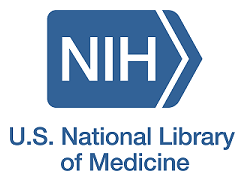

To Your Health: NLM update Transcript
Chronic fatigue syndrome progress: 01/09/2017

Image: Courtesy of the National Institutes of Health
Greetings from the National Library of Medicine and MedlinePlus.gov
Regards to all our listeners!
I'm Rob Logan, Ph.D., senior staff, U.S. National Library of Medicine (NLM).
Here is what's new this week in To Your Health - a consumer health oriented podcast from NLM - that helps you use MedlinePlus to follow up on weekly topics.
New support from the National Institutes of Health to fund studies about chronic fatigue syndrome follows some recent research progress, finds a news report in Science.
NIH officials told a recent international conference on chronic fatigue syndrome (CFS) that the federal agency plans to double current research support from about $7.6 million to $15 million in 2017. Science reports NIH also will solicit proposals from scientists to establish collaborative centers for basic research as well as share findings across the globe.
Several scientists told Science that NIH's commitment suggests the medical research agency is taking CFS more seriously and is paying attention to a 2015 report from the U.S. Institute of Medicine. Science notes the 2015 Institute of Medicine's report carefully identified CFS as a physiological instead of a psychological illness — and was based on more than 9,000 articles published within medical journals during a 64 year period.
Science notes the Institute of Medicine's report directly countered a common misconception that CFS was more linked to psychological disorders.
While Science reports CFS' biological underpinnings remain elusive for researchers and physicians, a recent study suggested men and women with CFS exhibited depressed blood levels of important metabolites compared to healthy adults. Science notes the study (and we quote): 'suggested that the disease may push the body into a low-energy state some have compared with hibernation' (end of quote).
MedlinePlus.gov explains CFS is when a person is chronically exhausted for six months or more. Science notes CFS sometimes worsens after physical, mental, or emotional exertion. CFS also is associated with short-term memory and concentration problems.
MedlinePlus.gov adds adults with CFS may experience widespread muscle and joint pain, immune system problems, headaches, and related challenges. Science explains CFS' onset sometimes follows an infectious illness. Science notes an estimated one million Americans have CFS.
Science explains while research on CFS medications and other interventions are preliminary and based on results from small samples of study participants, the trajectory of research and increasing acceptance of CFS' biological underpinnings should boost needed knowledge.
CFS' trajectory also is interesting because it provides an example of how new knowledge can shift prevailing attitudes about illnesses and yield new avenues of research and possible insights. As one of my NLM colleagues recently said (and I quote her): 'it's nice to see NIH and other medical institutions wake up about addressing CFS' (end of quote).
Meanwhile, the Mayo Foundation for Medical Education and Research provides a guide to CFS within the 'start here' section of MedlinePlus.gov's CFS health topic page.
A website from the U.S. Centers for Disease Control and Prevention suggests how persons with CFS should approach exercise and daily activities within the 'living with' section of MedlinePlus.gov's CFS health topic page.
MedlinePlus.gov's CFS health topic page also provides links to the latest pertinent journal research articles, which are available in the 'journal articles' section. Links to relevant clinical trials that may be occurring in your area are available within the 'clinical trials' section. You can sign up to receive updates about CFS as they become available on MedlinePlus.gov.
To find MedlinePlus.gov's CFS health topic page, please type 'CFS' in the search box on MedlinePlus.gov's home page, then, click on 'chronic fatigue syndrome (National Library of Medicine).' MedlinePlus.gov also has a health topic page devoted to fatigue.
Before I go, this reminder... MedlinePlus.gov is authoritative. It's free. We do not accept advertising .... and it is written to help you.
To find MedlinePlus.gov, just type 'MedlinePlus.gov' in any web browser, such as Firefox, Safari, Chrome, or Explorer, on any platform.
We encourage you to use MedlinePlus and please recommend it to your friends. MedlinePlus is available in English and Spanish. Some medical information is available in 48 other languages.
Your comments about this or any of our podcasts are always welcome.
Please email the podcast staff anytime at: NLMDirector@nlm.nih.gov
A written transcript of recent podcasts is available by typing 'To your health' in the search box on MedlinePlus.gov's home page.
The National Library of Medicine is one of 27 institutes and centers within the National Institutes of Health. The National Institutes of Health is part of the U.S. Department of Health and Human Services.
A disclaimer — the information presented in this program should not replace the medical advice of your physician. You should not use this information to diagnose or treat any disease without first consulting with your physician or other health care provider.
It was nice to be with you and happy new year! Please join us here next week and here's to your health!





















.png)












No hay comentarios:
Publicar un comentario